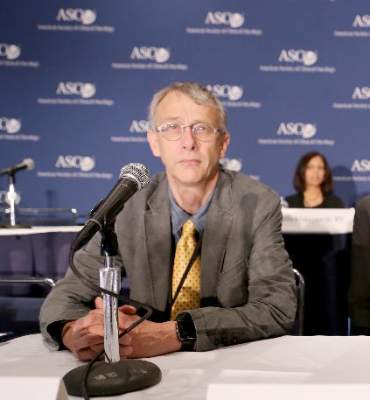AT THE 2016 ASCO ANNUAL MEETING
CHICAGO (FRONTLINE MEDICAL NEWS) – Adjuvant temozolomide given after radiation therapy improves survival of patients with a form of anaplastic glioma, a rare brain tumor. The patients had anaplastic glioma without 1p/19q co-deletion.
This co-deletion – the short arm of chromosome 1 and the long arm of chromosome 19 – is a favorable marker in the tumor, and patients without the deletion have traditionally done worse than those with the deletion. Until this study, no one knew if temozolomide would improve outcomes of patients without the co-deletion.
The four-arm, Phase III Trial on Concurrent and Adjuvant Temozolomide [TMZ] Chemotherapy in NON-1p/19q Deleted Anaplastic Glioma: The CATNON Intergroup Trial (EORTC 26053-22054), still ongoing, is testing radiotherapy, radiotherapy plus concurrent TMZ, radiotherapy plus 12 months of adjuvant TMZ, or radiotherapy plus concurrent TMZ plus 12 months of adjuvant TMZ. Adjuvant TMZ was given in 12 cycles.
Given the rarity of the tumor, the trial involved 118 institutions on three continents and ran for eight years between 2007 and 2015. From 1407 patients 18 years or older with World Health Organization performance status 0-2 screened, 751 were confirmed to have grade III anaplastic gliomas that were intact for 1p/19q (ie, no deletions). After radiation therapy with 59.4 Gy in 33 fractions, these patients were randomly assigned to one of the four treatment arms.
The trial asked two questions: Does adjuvant chemotherapy after radiotherapy improve outcome, and does chemotherapy concurrent with radiotherapy improve outcomes?
Just after enrollment was completed, a data monitoring committee recommended, based on an interim analysis in October 2015, that the data for the adjuvant arm be released, reported Dr. Martin van den Bent, professor of neuro-oncology at Erasmus MC Cancer Center in Rotterdam, The Netherlands. “It completely came as a surprise,” he said at a press conference at the annual meeting of the American Society of Clinical Oncology.
Comparing radiation with or without concurrent TMZ followed by adjuvant TMZ to treatment without adjuvant therapy, the overall survival at five years increased from 44% without any TMZ or with TMZ concurrent with radiation (n = 372) to 56% with adjuvant temozolomide (n = 373). “This corresponds to a hazard ratio of 0.67, a highly statistically significant increment,” Dr. van den Bent said.
Adjuvant TMZ was also associated with a statistically significant increase in median progression free survival from 19 months without adjuvant therapy to almost 43 months with it.
When patients were stratified by O6-methyl-guanine DNA methyltransferase (MGMT) promoter methylation status, the researchers found that MGMT methylation was prognostic for overall survival but not predictive of improved outcome to adjuvant TMZ.
For the nonadjuvant group, the median overall survival was 41 months (95% CI, 37-61 months), but the groups receiving adjuvant TMZ had not yet reached a median overall survival. “We know now that temozolomide given after radiation therapy improves survival in this disease,” Dr. van den Bent said.
A trial of such a rare disease requires many collaborating centers and oncology groups and a long duration to show improvements in outcome. Collaborating oncology groups across many countries “have shown the capacity to answer important clinical questions in orphan diseases,” he said.
Press conference moderator Dr. Don Dizon of Massachusetts General Hospital, Boston, said, “I think this illustrates… the theme of this year’s meeting, which is Collective Wisdom, and even more than that it illustrates that even with a rare tumor type and using standard chemotherapy it’s very important, and we can select patients who are most likely to benefit from treatment and at the same time potentially spare patients from the toxicities of therapy that they’re unlikely to benefit from.”
Results from the arm of the trial testing temozolomide given only at the time of radiation therapy are not yet available and are expected in 2020. In addition, investigators plan to assess genetic abnormalities that are known to affect prognosis in the disease, specifically MGMT promoter methylation and IDH (isocitrate dehydrogenase) mutation.
Common toxicities with temozolomide were mainly low platelet and white cell counts with severe toxicity in 5-10% of patients.
tor@frontlinemedcom.com





